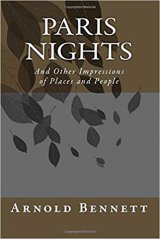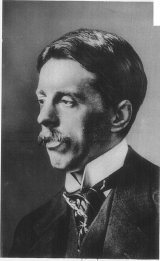Paris Nights and Other Impressions of Places and People Page #14
Enoch Arnold Bennett (27 May 1867 - 27 March 1931) was an English writer. He is best known as a novelist, but he also worked in other fields such as the theatre, journalism, propaganda and films. Bennett was born in a modest house in Hanley in the Potteries district of Staffordshire. Hanley was one of the Six Towns that were joined together at the beginning of the 20th century as Stoke-on-Trent and are depicted as "the Five Towns" in some of Bennett's novels. Enoch Bennett, his father, qualified as a solicitor in 1876, and the family moved to a larger house between Hanley and Burslem.
- Year:
- 1913
- 106,013 Views
“Le lendemain elle était sonnante.” VI--RUSSIAN IMPERIAL BALLET AT THE OPERA Sylvain’s is the only good restaurant in the centre of Paris where you can dine in the open air, that is to say, in the street. Close by, the dark, still mass of the Opéra rises hugely out of the dusk and out of the flitting traffic at its base. Sylvain’s is full of diners who have no eyes to see beyond the surfaces of things. By virtue of a contract made between Sylvain’s and the city, the diners are screened off from the street and from the twentieth century by a row of high potted evergreens. Pass within the screen, and you leave behind you the modern epoch. The Third Republic recedes; the Second Empire recedes; Louis-Philippe has never been, nor even Napoleon; the Revolution has not begun to announce itself. You are become suddenly a grand seigneur. Every gesture and tone of every member of the personnel of Sylvain’s implores your excellency with one word: “Deign!” It is curious that while a modern shopkeeper who sells you a cigar or an automobile or a quarter of lamb does not think it necessary to make you a noble of the ancien régime before commencing business, a shopkeeper who sells you cooked food could not omit this preliminary without losing his self-respect. And it is the more curious since all pre-democratic books of travel are full of the cheek of these particular shopkeepers. Such tales of old travellers could scarcely be credited, in spite of their unison, were it not that the ancient tradition of rapacious insolence still survives in wild and barbaric spots like the cathedral cities of England. Your excellency, attended by his gentlemen-in-waiting (who apparently never eat, never want to eat), in the intervals of the ceremonious collation will gaze with interest at the Opéra, final legacy of the Empire to the Republic. A great nation owes it to itself to possess a splendid opera-palace. Art must be fostered. The gracious amenities of life must be maintained. And this is the State’s affair. The State has seen to it. The most gorgeous building in Paris is not the legislative chamber, nor the hall of the University, nor the clearing-house of charity. It is the Opéra. The State has paid for it, and the State pays every year for its maintenance. That is, the peasant chiefly pays. There is not a peasant in the farthest corner of France who may not go to bed at dark comforted by the thought that the Opéra in Paris is just opening its cavalry-sentinelled doors, and lighting its fifteen thousand electric candles, and that he is helping to support all that. Paris does not pay; the habitués of the Opéra do not pay; the yawning tourists do not pay; the grandiose classes do not pay. It is the nation, as a nation, that accepts the burden, because the encouragement of art is a national duty. (Moreover, visiting monarchs have to be diverted.) Of one sort or another, from the tenor to the vendor of programmes, there are twelve hundred priests and priestesses of art in the superb building. A few may be artists. But it is absolutely certain that all are bureaucrats. The Opéra is the Circumlocution Office. The Opéra is a State department. More, it is probably the most characteristic of all the State departments, and the most stubbornly reactionary. The nominal director, instead of being omnipotent and godlike, is only a poor human being whose actions are the resultant of ten thousand forces that do not fear him. The Opéra is above all the theatre of secret influences. Every mystery of its enormous and wasteful inefficiency can be explained either by the operation of the secret influence or by the operation of the bureaucratic mind. If the most tedious operas are played the most often, if the stage is held by singers who cannot sing, if original artists have no chance there, if the blight of a flaccid perfunctoriness is upon nearly all the performances, if astute mothers can sell the virginity of their dancing daughters to powerful purchasers in the wings, the reason is a reason of State. The Opéra is the splendid prey of the high officers of State. If such a one wants an evening’s entertainment, or a mistress, or to get rid of a mistress, the Opéra is there, at his disposition. The foyer de la danse is the most wonderful seraglio in the western world, and it is reserved to the Government and to subscribers. Thus is art fostered, and for this does the peasant pay. Nevertheless the Opéra is a beautiful and impressive sight in the late, warm dusk of June. Against the deep purple sky the monument stands up like a mountain; and through its innumerable windows--holes in the floor of heaven--can be glimpsed yellow clusters of candelabra and perspectives of marble pillars and frescoed walls. And at the foot of the gigantic façade little brightly coloured figures are running up the steps and disappearing eagerly within: they are the world of fashion, and they know that they are correct and that the Opéra is the Opéra. ***** I looked over the crimson plush edge of the box down into Egypt, where Cleopatra was indulging her desires; into a civilisation so gorgeous, primitive, and far-off that when compared to it the eighteenth and the twentieth centuries seemed as like as two peas in their sophistication and sobriety. Cleopatra had set eyes on a youth, and a whim for him had taken her. By no matter what atrocious exercise of power and infliction of suffering, that whim had to be satisfied on the instant. It was satisfied. And a swift homicide left the Queen untrammelled by any sentimental consequences. The whole affair was finished in a moment, and the curtain falling on all that violent and gorgeous scene. In a moment this Oriental episode, interpreted by semi-Oriental artists, had made all the daring prurient suggestiveness of French comedy seem timid and foolish. It was a revelation. A new standard was set, and there was not a vaudevillist in the auditorium but knew that neither he nor his interpreters could ever reach that standard. The simple and childlike gestures of the slave-girls as with their bodies and their veils they formed a circular tent to hide Cleopatra and her lover--these gestures took away the breath of protest. [Illustration: 0107] The St. Petersburg and the Moscow troupes, united, of the Russian Imperial Ballet, had been brought to Paris, at vast expense and considerable loss, to present this astounding spectacle of mere magnificent sanguinary lubricity to the cosmopolitan fashion of Paris. There the audience actually was, rank after rank of crowded toilettes rising to the dim ceiling, young women from the Avenue du Bois and young women from Arizona, and their protective and possessive men. And nobody blenched, nobody swooned. The audience was taken by assault. The West End of Europe was just staggered into acceptance. As yet London has seen only fragments of Russian ballet. But London may and probably will see the whole. Let there be no qualms. London will accept also. London might be horribly scared by one-quarter of the audacity shown in Cleopatra, but it will not be scared by the whole of that audacity. An overdose of a fatal drug is itself an antidote. The fact is, that the spectacle was saved by a sort of moral nudity, and by a naïve assurance of its own beauty. Oh! It was extremely beautiful. It was ineffably more beautiful than any other ballet I had ever seen. An artist could feel at once that an intelligence of really remarkable genius had presided over its invention and execution. It was masterfully original from the beginning. It continually furnished new ideals of beauty. It had drawn its inspiration from some rich fountain unknown to us occidentals. Neither in its scenery, nor in its grouping, nor in its pantomime was there any clear trace of that Italian influence which still dominates the European ballet. With a vengeance it was a return to nature and a recommencement. It was brutally direct. It was beastlike; but the incomparable tiger is a beast. It was not perverse. It was too fresh, zealous, and alive to be perverse. Personally I was conscious of the most intense pleasure that I had experienced in a theatre for years. And this was Russia! This was the country that had made such a deadly and disgusting mess of the Russo-Japanese War.
Translation
Translate and read this book in other languages:
Select another language:
- - Select -
- 简体中文 (Chinese - Simplified)
- 繁體中文 (Chinese - Traditional)
- Español (Spanish)
- Esperanto (Esperanto)
- 日本語 (Japanese)
- Português (Portuguese)
- Deutsch (German)
- العربية (Arabic)
- Français (French)
- Русский (Russian)
- ಕನ್ನಡ (Kannada)
- 한국어 (Korean)
- עברית (Hebrew)
- Gaeilge (Irish)
- Українська (Ukrainian)
- اردو (Urdu)
- Magyar (Hungarian)
- मानक हिन्दी (Hindi)
- Indonesia (Indonesian)
- Italiano (Italian)
- தமிழ் (Tamil)
- Türkçe (Turkish)
- తెలుగు (Telugu)
- ภาษาไทย (Thai)
- Tiếng Việt (Vietnamese)
- Čeština (Czech)
- Polski (Polish)
- Bahasa Indonesia (Indonesian)
- Românește (Romanian)
- Nederlands (Dutch)
- Ελληνικά (Greek)
- Latinum (Latin)
- Svenska (Swedish)
- Dansk (Danish)
- Suomi (Finnish)
- فارسی (Persian)
- ייִדיש (Yiddish)
- հայերեն (Armenian)
- Norsk (Norwegian)
- English (English)
Citation
Use the citation below to add this book to your bibliography:
Style:MLAChicagoAPA
"Paris Nights and Other Impressions of Places and People Books." Literature.com. STANDS4 LLC, 2024. Web. 24 Dec. 2024. <https://www.literature.com/book/paris_nights_and_other_impressions_of_places_and_people_110>.




Discuss this Paris Nights and Other Impressions of Places and People book with the community:
Report Comment
We're doing our best to make sure our content is useful, accurate and safe.
If by any chance you spot an inappropriate comment while navigating through our website please use this form to let us know, and we'll take care of it shortly.
Attachment
You need to be logged in to favorite.
Log In